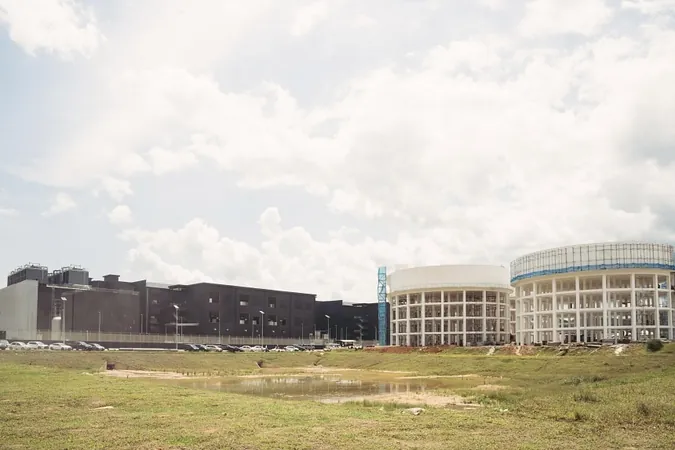
Johor's Bold Move: Nearly 30% of Data Centre Applications Rejected to Safeguard Resources
2024-11-19
Author: Wei Ling
Introduction
In a groundbreaking initiative, the Malaysian state of Johor has turned away nearly 30% of data centre applications over the past five months, a move aimed at protecting local resources while ensuring economic benefits for residents.
Johor's Data Centre Ambitions
Johor has swiftly risen as the leading data centre hub in Malaysia, with ambitions to become the largest such market in Southeast Asia.
The state authorities commenced a thorough vetting process involving an ad hoc committee in June 2024, amid fears that the influx of billion-dollar data centres might deplete vital local utilities, particularly water and electricity.
Rejections Due to Unsustainable Practices
Mr. Lee Ting Han, vice-chair of Johor’s data centre development coordination committee, revealed that four out of 14 applications from international data centre operators were rejected due to unsustainable practices in managing water and power resources.
He emphasized the necessity for applicants to propose strategic plans detailing location, sustainability initiatives, and job offerings with competitive wages.
Concerns Over Site Locations
Concerns over unsuitable site locations were major factors in the rejections, with operators failing to prove that their choices would not strain the local populations’ access to essential resources.
Rapid Growth of Data Centre Capacity in Johor
Since the beginning of 2021, Johor's data centre capacity has surged from a mere 10 megawatts (MW) to around 1.3 gigawatts (GW) currently, a figure expected to double by 2027.
The state currently features 13 operational data centres, occupying more than 1.65 million square feet of space, according to data from Baxtel, a research firm specializing in data centres.
Construction Trends and Market Competition
The construction of data centres in Johor has seen a notable uptick, especially following Singapore's stringent moratorium on new data centre projects instituted in 2019 due to limited land and power supplies.
Singapore remains a prominent data centre market in the Asia-Pacific region, with over 70 facilities and significant capacity, but Johor is now presenting itself as a viable alternative for expansion.
New Regulatory Requirements
Recent regulatory changes require data centre operators to secure the approval of Johor’s development committee before obtaining a development order, a transition from past practices where only local planning authority approval was required.
Support for Regulatory Enhancements
Industry leaders like Gary Goh, director of Sprint DC Consulting, support these regulatory enhancements, advocating for preliminary consultations to refine application proposals prior to submission.
Focus on Sustainability and Job Creation
The Johor government is resolute in its rigorous criteria for evaluating data centre applications, focusing on sustainability practices, job creation for skilled labor, and potential client engagement for future operational success.
This is particularly critical as Johor competes with Singapore for skilled professionals, with the latter's stronger dollar making it an attractive workplace.
Salary Structure and Talent Attraction
On November 4, Deputy Minister of Investment, Trade and Industry Liew Chin Tong indicated that a salary structure offering approximately two-thirds of Singapore's pay would entice Malaysian talent back to Johor.
Although there are no legal mandates for salary benchmarks, the committee holds the power to reject applications from operators that do not align with these standards.
Projected Salaries
Anticipated salaries for fresh graduates in the region are projected to start at RM4,000 monthly, considerably higher than the prevailing industry average of RM2,800.
Experienced professionals can command salaries exceeding RM10,000 a month.
Government's Position on Data Centre Projects
In light of these developments, Malaysian Prime Minister Anwar Ibrahim has stressed the importance of carefully assessing data centre projects to ensure they contribute to high-income job creation and knowledge transfer to the local workforce.
Drafting Sustainable Development Guidelines
The federal government is drafting sustainable development guidelines that will soon set the standard for data centre operations in Malaysia.
These guidelines, set to be revealed by the fourth quarter of 2024, will include critical metrics like power and water usage efficiency, along with carbon emissions effectiveness.
Advocating for Renewable Energy Integration
The Ministry of Investment, Trade and Industry (MITI) is advocating for the integration of renewable energy sources and efficient resource management to ensure data centres operate sustainably without jeopardizing the local environment.
Conclusion
As Johor continues to grow as a data centre giant, its commitment to sustainability and resource management could serve as a blueprint for other regions facing similar challenges.
The heart of Johor's strategy is clear: achieving progress without compromising the very resources that local communities depend on.

 Brasil (PT)
Brasil (PT)
 Canada (EN)
Canada (EN)
 Chile (ES)
Chile (ES)
 España (ES)
España (ES)
 France (FR)
France (FR)
 Hong Kong (EN)
Hong Kong (EN)
 Italia (IT)
Italia (IT)
 日本 (JA)
日本 (JA)
 Magyarország (HU)
Magyarország (HU)
 Norge (NO)
Norge (NO)
 Polska (PL)
Polska (PL)
 Schweiz (DE)
Schweiz (DE)
 Singapore (EN)
Singapore (EN)
 Sverige (SV)
Sverige (SV)
 Suomi (FI)
Suomi (FI)
 Türkiye (TR)
Türkiye (TR)